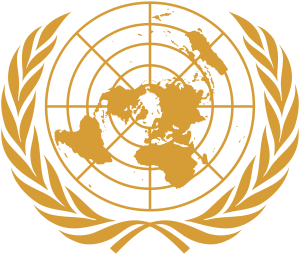High-level Political Forum on Sustainable Development
The United Nations High-level Political Forum on Sustainable Development (HLPF) is a subsidiary body of both the United Nations General Assembly and the United Nations Economic and Social Council responsible for the entire organization's policy on sustainable development. It adopts negotiated declarations, reviews commitment and the progress of the 2030 Agenda for Sustainable Development. The Forum replaced the Commission on Sustainable Development on the 24 September 2013 [1] Meetings of the Forum are open to all Member States of the United Nations.
 | |
| Abbreviation | HLPF |
|---|---|
| Formation | 9 July 2013 |
| Type | Intergovernmental organization, Regulatory body, Advisory board |
| Legal status | Active |
| Headquarters | New York, USA |
Parent organization | United Nations Economic and Social Council United Nations General Assembly |
| Website | HLPF on sustainabledevelopment.un.org |
History
The HLPF has its origin in the Commission on Sustainable Development (CSD), which was created in 1992 to ensure follow-up of the Conference on Environment and Development (UNCED).[2] This Commission met a total of 20 times, with its last session on 20 September 2013.
At the 2012 Conference on Sustainable Development, or Rio+20, it was decided that the Commission would be replaced by the High-Level Political Forum on Sustainable Development. This new Forum would meet under the auspices of both the Economic and Social Council, as well as the General Assembly. The Forum was formally created by Resolution 67/290 on 9 July 2013.[3]
As the Forum is held under the authority of both the Economic and Social Council and the General Assembly, the body hosts two different types of meetings:
- While under the auspices of the General Assembly: Once every four years at the level of Heads of State and Government for a period of two days.
- While under the auspices of the Economic and Social Council: Yearly, for a period of eight days, including a three-day ministerial segment.
Its meetings are held in July.
Mandate
The HLPF was created with the aim to strengthen sustainable development governance at the United Nations. It works to achieve this through its mandate, which states the following in respect to sustainable development:[3][4]
Resolution A/RES/66/288:
- (a) Provide political leadership, guidance and recommendations for sustainable development;
- (b) Enhance integration of the three dimensions of sustainable development...at all levels;
- (c) Provide a dynamic platform for regular dialogue...to advance sustainable development;
- (d) Ensuring the appropriate consideration of new and emerging sustainable development challenges;
- (e) Follow up and review progress in the implementation of previous United Nations sustainable development commitments;
- (g) Improve cooperation and coordination within the United Nations system on sustainable development programmes and policies;
- (i) Promote the sharing of best practices and experiences relating to the implementation of sustainable development;
- (j) Promote system-wide coherence and coordination of sustainable development policies;
Resolution A/RES/67/290:
- (a) Shall provide political leadership, guidance and recommendations for sustainable development,
- (b) Follow up and review progress in the implementation of sustainable development commitments,
- (c) Enhance the integration of the three dimensions of sustainable development in a holistic and cross-sectoral manner at all levels;
- (d) Ensure the appropriate consideration of new and emerging sustainable development challenges;
- (e) Devote adequate time to the discussion of the sustainable development challenges facing developing countries;
Meetings
Every year since 2013, the HLPF has held a session.
| Year | Auspices | Dates | Theme | Ref |
|---|---|---|---|---|
| 2019 | GA | 24 Sep – 25 Sep | SDG Summit | [5] |
| 2019 | ECOSOC | 9 Jul – 18 Jul | Empowering people and ensuring inclusiveness and equality | [6] |
| 2018 | ECOSOC | 9 Jul – 18 Jul | Transformation towards sustainable and resilient societies | [7] |
| 2017 | ECOSOC | 10 Jul – 19 Jul | Eradicating poverty and promoting prosperity in a changing world | [8] |
| 2016 | ECOSOC | 11 Jul - 20 Jul | Ensuring that no one is left behind | [9] |
| 2015 | ECOSOC | 26 Jun – 8 Jul | Strengthening integration, implementation and review - the HLPF after 2015 | [10] |
| 2014 | ECOSOC | 30 Jun - 9 Jul | Achieving the MDGs and charting the way for an ambitious post-2015 development agenda, including the SDGs | [11] |
| 2013 | GA | 24 Sep | Building the future we want: from Rio+20 to the post-2015 development agenda | [12] |
Sustainable Development Commitments Review
The Forum is responsible for the follow up and the review of progress of implementation of the following sustainable development commitments:[4]
- Agenda 21
- Johannesburg Plan of Implementation
- Barbados Programme of Action
- Mauritius Strategy
- Rio+20
- LDC-IV
As well as the relevant outcomes of other United Nations summits and conferences.
See also
- Sustainable Development Goals
- United Nations Conference on Sustainable Development
- Earth Summit
- Durban III The conference opened on 22 September 2011
- Planetary boundaries
References
- "High-level Political Forum". sustainabledevelopment.un.org. United Nations. n.d. Retrieved 14 November 2018.
- "Commission on Sustainable Development (CSD)". sustainabledevelopment.un.org. United Nations. n.d. Retrieved November 14, 2018.
- United Nations General Assembly Session 67 Resolution 290. Format and Organizational Aspects of the High-Level Political Forum on Sustainable Development A/RES/67/290 9 July 2013. Retrieved 14 November 2018.
- United Nations General Assembly Session 66 Resolution 288. The Future We Want A/RES/66/288 27 July 2012. Retrieved 14 November 2018.
- un.org - SDG Summit 2019
- un.org - High-level Political Forum 2019
- un.org - High-level Political Forum 2018
- un.org - High-level Political Forum 2017
- un.org - High-level Political Forum 2016
- un.org - High-level Political Forum 2015
- un.org - High-level Political Forum 2014
- un.org - High-level Political Forum 2013